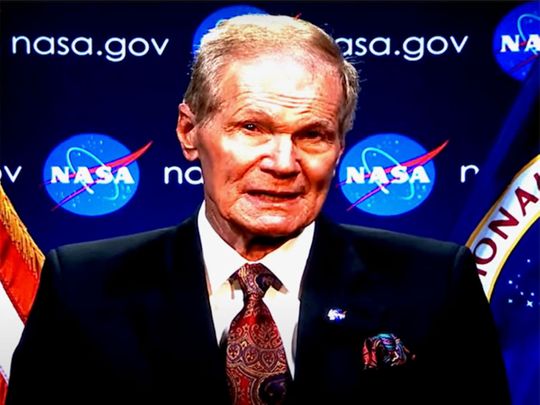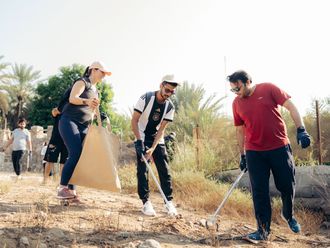
Abu Dhabi: NASA chief Bill Nelson has dubbed the UAE a leader in the peaceful and safe exploration of outer space, and expressed his eagerness to include the first Emirati astronaut as a long-term crew member to the International Space Station (ISS) next year.
Speaking in a video address at the Abu Dhabi Space Debate, Nelson also called the two-day forum “a great opportunity…to discuss the important issues facing the incredible growths in space activity and industry”.
Nelson explained that the United States developed a law in 2010 to chart out the future direction of its space agency, the National Aeronautics and Space Administration (NASA), with one path enabling the government to explore the furthest reaches of the cosmos, and another creating a commercial space programme for the private space sector. Since then, NASA has launched numerous astronauts to the International Space Station.
Emirati astronaut mission
“We have launched 22 astronauts to the International Space Station as part of this commercial crew programme, and that [number] includes several from our international partners. Our next crew launch to the ISS – Crew 6 – will include the UAE’s first long-duration crew member to the ISS, next year in spring. [Emirati astronaut] Sultan Al Neyadi will join the crew. This is an exciting time for commercial space, and we look forward to Al Neyadi’s mission,” Nelson told the Abu Dhabi conference.
Al Neyadi will become the second Emirati astronaut to go to space after Hazza Al Mansouri travelled to the International Space Station aboard a Russian spacecraft for an eight-day mission. Unlike Al Mansoori’s, Al Neyadi’s mission is expected to extend for six months. It will be being carried out by the NASA and Axiom Space Inc., a leading human spaceflight and infrastructure company, and Mohammed bin Rashid Space Centre (MBRSC) has signed a strategic spaceflight cooperation with the two.
Announcing Emirati cooperation in the mission in April 2022, His Highness Sheikh Mohammed bin Rashid Al Maktoum, Vice President and Prime Minister of the UAE and Ruler of Dubai, had called it a new milestone for the UAE space sector, especially as it will make the country among just 11 nations in the world to carry out long-term space missions.
Timely forum
The inaugural Abu Dhabi Space Debate has gathered experts like Nelson in the capital to explore opportunities and challenges in the field. Nelson’s remarks highlighted the timeliness of the forum in light of its work on the Artemis missions, which aim to explore more of the lunar surface in a bid to eventually send the first astronauts to Mars. NASA has already launched the Space Launch System for its Artemis I mission, which Nelson called the “most powerful rocket ever”, carrying the Orion Spacecraft. The Orion has made its first trip past the moon, and Nelson said this lunar mission will be followed by the Emirates Lunar Mission, which aims to land the Rashid Rover on the moon.
Need for cooperation
“As we move beyond the low-earth orbit, now more than ever, it is important to develop strong international cooperation and collaboration for civilian space exploration. With [the] Artemis missions, NASA will develop innovative technologies to explore more of the lunar surface than ever before, and all of this is in preparation for us to send humans to Mars. We will expand our collaboration and commercial efforts with our international partners to establish the first long-term presence on the moon, and we will do these things collaboratively and responsibly, and with openness,” Nelson said.
“A growing number of nations have signed on to the Artemis Accords because we share the view that the net era of space exploration should be done peacefully, safely and transparently. And the UAE and many countries in this conference have been leaders in this important task. I thank you very much for being our partners,” he added.
UAE is a signatory to the Artemis Accords, a series of non-binding multilateral agreements between the US government and other world governments participating in the Artemis Programme, a NASA-led effort to return humans to the moon by 2023, and to expand space exploration to Mars and beyond.
Inclusivity of space
“Last September, we had the first meeting of the Artemis Accords signatories and identified a few topics of global importance, [such as how to] deconflict activities on the moon and Mars, and [how to] create opportunities for meaningful contributions to the Artemis programme for smaller and developing space agencies and nations. Space exploration has the greatest impact on humanity when the opportunities are there for the participation of all,” Nelson said.
Salem Al Qubaisi, director general of the UAE Space Agency, echoed the same call for international collaboration during a panel session on the second day of the Abu Dhabi Space Debate
“With bilateral or multilateral cooperation, you don’t need to reinvent the wheel. For any nation state, serving the national interest is their priority…[But] the good thing about the spo=ace sector is that it is inclusive for everyone. You can cooperate and still serve the national interest at the same time. There are [issues] that we have to iron out, and we know there are big challenges to get there. But keeping the spirit of inclusiveness and cooperation will help us get there eventually,” Al Qubaisi said.
International presence
He was joined on the panel by Christian Hauglie-Hanssen, director general of the Norwegian Space Agency, Richard Conde, president of the Portugal Space Agency, Dr Joel Marciano Jr, director general of the Philippine Space Agency, Dr Aleksandra Bukala, director of the Polish Space Agency’s department of strategy and international cooperation, and Dr Mohamed Al Aseeri, chief executive officer of the Bahraini National Space Science Agency.
The Abu Dhabi Space Debate aims to enhance communication between space nations and private sector players in the space industry. Its organisation represents the UAE’s growing space capabilities.
UAE achievements
The UAE is currently one of only six countries globally to launch a successful Mars orbiter. In total, it has launched 19 orbital satellites till date, with more than 10 new spacecraft under development.
The UAE also houses more than 50 global and emerging space companies, institutions and facilities, as well as five research centers for space sciences, and three universities with dedicated space programme. At present, more than 3,000 workers, engineers and experts are actively involved in the country’s space sector.












